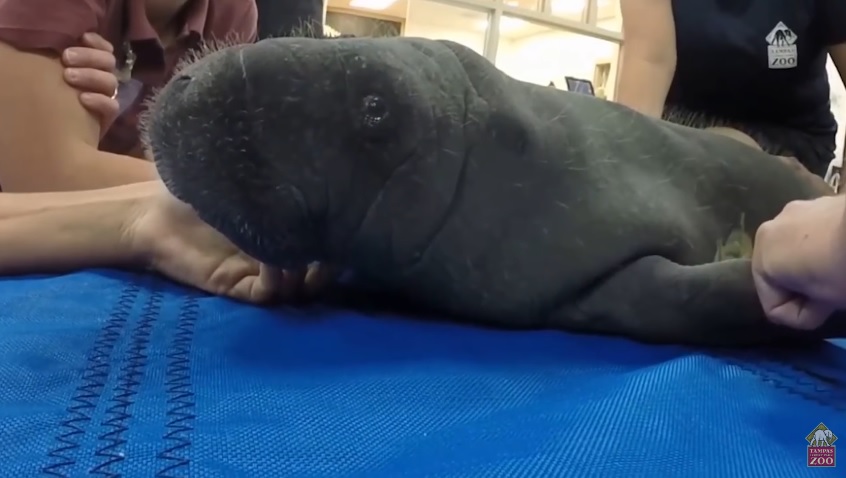Orphaned baby manatee had plastic in his stomach - vets say humans are to blame for his death
Sign up now: Get ST's newsletters delivered to your inbox

Orphaned manatee Emoji being treated at the zoo before his death.
PHOTO: YOUTUBE
Follow topic:
TAMPA BAY, Florida (WASHINGTON POST) - Emoji, an orphaned manatee, was about 7kg underweight when he was rescued and taken to a Florida zoo in October.
But that was not the gravest concern.
Plastic bags and debris filled the two-week-old calf's stomach. Ingested trash was protruding from his rectum.
After being separated from his mother, the young calf was left to fend for himself, mistakenly consuming plastic bags as he scrounged the seafloor for something to eat, said Ray Ball, a senior veterinarian for the Lowry Park Zoo in Tampa.
Veterinarians later found that he was suffering from disseminated intravascular coagulation, which makes manatees bleed and clot at the same time. It's a common condition, but Ball said Emoji's case was one of the most severe he's ever seen.
And on Monday, just as he was starting to gain weight and show other signs of progress, Emoji died.
The young calf had survived for just three months since his rescue.
"Emoji is a tragic illustration of the consequences that simple human actions have on the world around us," Ball said in a statement. "Now more than ever, we must hold ourselves accountable, whether that's keeping trash and plastics out of our waterways or being more mindful of potential consequences of propeller strikes on wildlife while boating."
That Emoji survived as long as he did was a surprise. His condition was so critical that veterinarians decided they had to try a novel treatment approach, Ball said. Emoji was given blood thinners to try to resolve his clotting issue, and he slowly got better.
"The phrase we used was guardedly optimistic," Ball said. "We were encouraged, but we knew he had a long way to go."
He was eating lettuce and drinking some formula, Ball said. The zoo even posted a video of Emoji swimming with other manatees in a large habitat. By the end of January, he'd gained almost 9kg.
But on Sunday, Emoji refused to eat and wasn't as energetic as normal. Because of his pre-existing conditions, he was not able to respond well to health troubles common to baby manatees, Ball said. Calves, for example, normally have stomach pains when they start taking formula.
"He was experiencing a normal colic episode that we would expect in a lot of our babies," Ball said. "He didn't really take the bottles that we fed him... He just wasn't able to respond as well as a typical baby would."
Ball said it's not unusual for calves to ingest plastics and debris - a problem that is widespread among marine animals, particularly seabirds and turtles.
There are 5.25 trillion pieces of plastic debris in the ocean, according to National Geographic. Of that, 269,000 tonnes float on the surface.
The largest swath of trash in the ocean, known as the Great Pacific Garbage Patch, sometimes extends from Japan to San Francisco, depending on the direction and movement of the wind and waves.
Recent studies have found that half the planet's sea turtles and nearly all of the world's seabirds have ingested some form of plastic.
In 2009, photographer Chris Jordan headed off to remote Midway Island and photographed decaying bodies of birds. Their stomachs were completely filled with plastic.
"It's a pretty stunning experience to go out there and to see so much death," Jordan told The Washington Post's May-Ying Lam in 2012.
More recently, a 13m-long female sei whale died in 2014 after ingesting a broken piece of a DVD case. The plastic lacerated her stomach and kept her from feeding, according to National Geographic. Sei whales are listed as endangered.
Trash can be hazardous to wildlife on land as well. In 2015, a 175-pound black bear had to be rescued after getting its head stuck in a milk can in Frederick County, Maryland. State wildlife experts tranquilised the animal and used a small saw to remove the can.
Last week, Maryland wildlife officials rescued a deer whose head had been stuck in a plastic pretzel jug for several days.
Emoji's death, Ball said, is a strong reminder of how human actions can limit animals' chances of survival.
"His loss is not being taken lightly," Ball said.
The young calf's name was inspired by the zoo's campaign to raise awareness about manatees through a petition that called for the creation of a manatee emoji.
Andrea Alava, a spokeswoman for the zoo, said the petition now has 25,000 signatures.
"The more we can get people talking about manatees and ways to protect them, the better," Ball said. "It's a lesson that simple human behaviour, like not throwing trash in waterways, can prevent manatee injuries and deaths."

